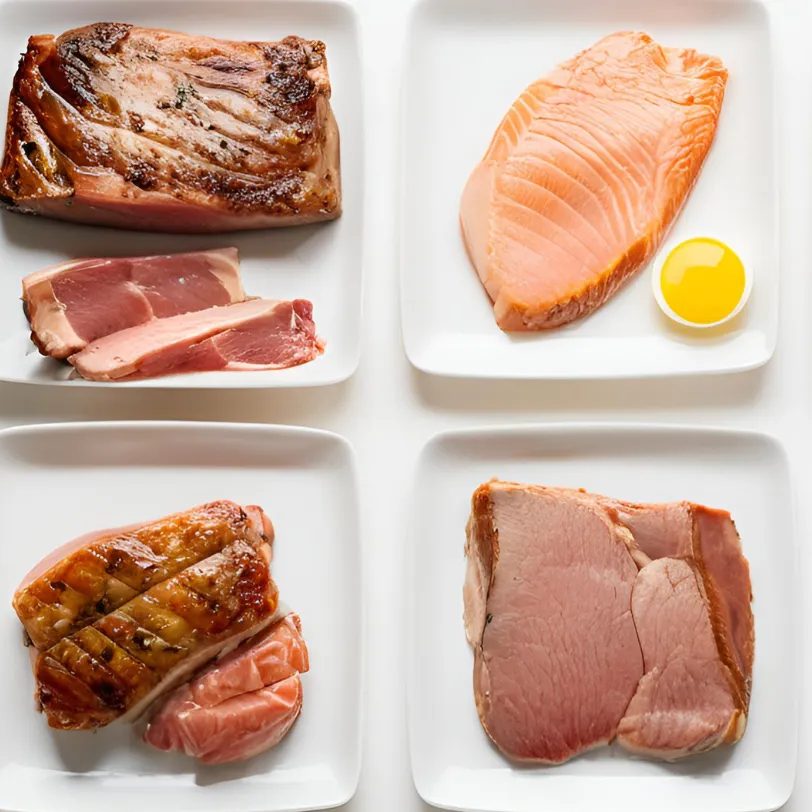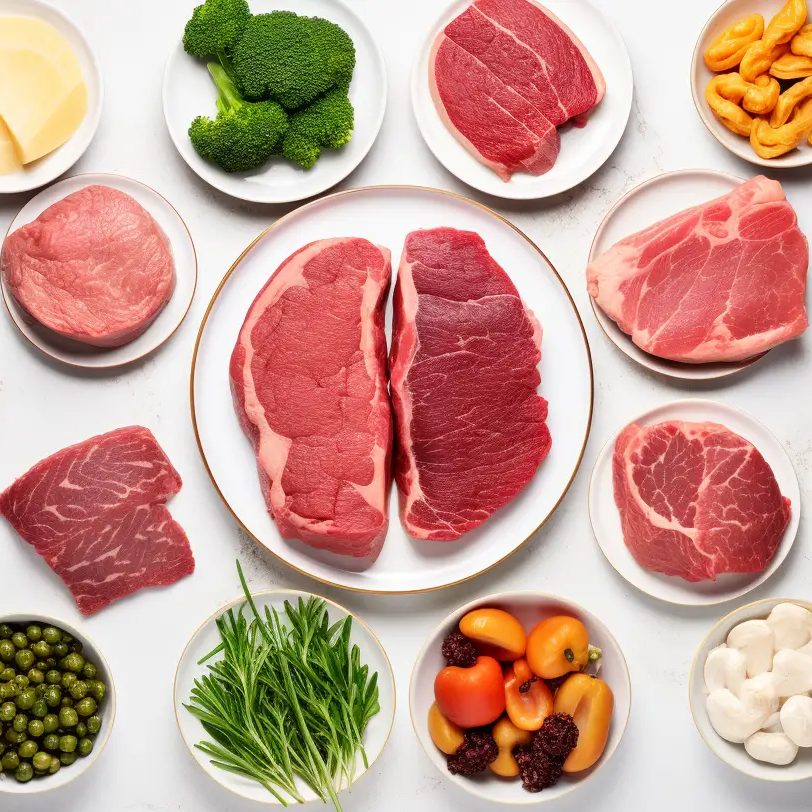The carnivore diet, consisting solely of animal products, has gained popularity among those looking for a nutrient-dense, high-protein, low-carb nutrition plan. This comprehensive guide explores the fundamentals of the carnivore diet, its benefits, a detailed meal plan, snack ideas, preparation tips, potential challenges, and tips for successful adherence.
Fundamentals of the Carnivore Diet
Understanding the Diet
The carnivore diet is centered around consuming only animal products, including meat, fish, eggs, and some dairy. This means eliminating all plant-based foods, such as vegetables, fruits, grains, and legumes. The diet focuses on nutrient-dense animal foods that provide essential vitamins and minerals. By restricting carbohydrates almost entirely, the diet aims to shift the body’s energy source from glucose to fats, promoting ketosis. The simplicity of the diet appeals to those seeking to avoid allergens, anti-nutrients, and added sugars.
Key Principles
Following the carnivore diet involves adhering to a few fundamental principles. Firstly, prioritize nutrient-dense animal products like organ meats, which are rich in vitamins and minerals. Secondly, ensure an adequate intake of fats through fatty cuts of meat and animal fats like tallow or butter. Hydration is also important; drink plenty of water and consider bone broth for electrolytes. Finally, listen to your body’s hunger cues and eat until you feel satisfied. Understanding these principles helps maintain a balanced and nutritious carnivore diet.

Benefits of the Carnivore Diet
Weight Loss
One of the primary benefits of the carnivore diet is weight loss. By eliminating carbohydrates, the body turns to stored fats for energy, promoting fat loss. High-protein and high-fat foods increase satiety, helping reduce overall calorie intake without the need for strict calorie counting. Many individuals report significant weight loss within a few weeks of starting the diet. This approach can be particularly effective for those struggling with obesity or metabolic issues.
Improved Health Markers
The carnivore diet can lead to improved health markers, such as lower blood sugar levels, reduced inflammation, and better lipid profiles. Many followers report improved mental clarity, stable energy levels, and fewer digestive issues. Animal-based foods are rich in essential nutrients like B vitamins, omega-3 fatty acids, and high-quality proteins that support overall health. Studies suggest that reducing carbohydrate intake may benefit those with insulin resistance or autoimmune conditions.
Detailed Carnivore Diet Meal Plan
Breakfast Options
Starting your day with a nutrient-dense, protein-rich breakfast sets the tone for the day. Some popular carnivore breakfast options include a steak with eggs, bacon and sausage, or a cheese omelet. For variety, try an organ meat smoothie with liver and bone broth, or smoked salmon with cream cheese. Breakfast on the carnivore diet focuses on high-protein, high-fat foods to keep you full and energized until your next meal.
Lunch and Dinner Options
For lunch and dinner, focus on a variety of meats and fish to ensure a diverse nutrient intake. Grilled ribeye steak, baked salmon with butter, roasted chicken thighs, and lamb chops are all excellent choices. Don’t forget organ meats like liver and kidney; they are nutrient powerhouses. Try slow-cooked beef stew, bone marrow, or pork belly. Pair meals with a rich bone broth or add a side of scrambled eggs with cheese for added protein. These meals provide sustained energy and essential nutrients.

Snack Ideas for the Carnivore Diet
Quick and Easy Snacks
Snacking on the carnivore diet can be straightforward and satisfying. Quick snacks include hard-boiled eggs, beef jerky, pork rinds, or cheese slices. Canned sardines or mackerel offer convenient, nutrient-dense options. For a rich and savory treat, try bone marrow or liver pâté. These snacks are not only high in protein and fat but also easy to carry and consume on-the-go.
Homemade Snack Ideas
For homemade snack ideas, consider making beef or chicken liver pâté, which can be spread on slices of cheese or eaten alone. Homemade meatballs or sausage links are also excellent options. Another idea is to prepare deviled eggs or bacon-wrapped liver bites in advance. These snacks can be stored in the fridge and consumed as needed, ensuring you always have carnivore-friendly options at hand.
Preparation Tips for the Carnivore Diet
Meal Prep Strategies
Effective meal preparation is key to adhering to the carnivore diet. Batch-cook large portions of meat, such as roasting a whole chicken or slow-cooking a pot of beef stew, to have ready-made meals throughout the week. Invest in quality storage containers to keep cooked meats fresh in the refrigerator or freezer. Planning meals and snacks in advance helps prevent last-minute, non-carnivore food choices, ensuring adherence to the diet.
Cooking Techniques
Utilize various cooking techniques to maintain meal variety and prevent food fatigue. Grilling, roasting, and broiling can bring out rich flavors in meats, while slow-cooking and braising ensure tenderness. Pan-searing steaks or pork chops provides a quick and flavorful meal. Experiment with seasoning and butter or ghee to enhance flavors. These cooking techniques not only preserve the nutrient content of meats but also add diversity to your meals.
Potential Challenges and Solutions
Addressing Nutrient Deficiencies
One potential challenge of the carnivore diet is addressing nutrient deficiencies. While the diet is rich in certain nutrients, it may lack others like vitamin C and fiber. Organ meats, particularly liver, are essential for obtaining a wide range of vitamins and minerals. Bone broth can provide electrolytes like magnesium and potassium. It’s important to monitor your health and consider supplements if necessary. Consulting with a healthcare professional can help ensure balanced nutrition.
Social and Lifestyle Adjustments
Adhering to the carnivore diet can be challenging in social situations and when eating out. Planning ahead is essential; research restaurant menus and choose places that offer meat-based dishes. Communicate your dietary preferences to friends and family to garner support. Bringing your own food to social gatherings can also help you stay on track. While it may require some adjustments, maintaining flexibility and preparation can make the carnivore diet manageable in various settings.

Tips for Successful Adherence
Setting Realistic Goals
Setting realistic and achievable goals is crucial for successful adherence to the carnivore diet. Identify specific health objectives, such as weight loss, increased energy, or improved digestion. Break these goals down into smaller, actionable steps, like incorporating more organ meats or reducing processed foods. Track your progress regularly and celebrate small milestones. Keeping a food diary can help monitor adherence and make necessary adjustments. Realistic goals provide motivation and a clear path to success.
Staying Motivated
Staying motivated on the carnivore diet can be challenging, especially during the initial transition period. Finding motivation sources can help sustain adherence. Join online communities or support groups with individuals following the same diet to share experiences and gain encouragement. Experimenting with new recipes and flavors can keep the diet exciting and enjoyable. Regularly review the benefits experienced, such as weight loss, improved energy, and better overall health, to reinforce the positive impact of the diet.
In conclusion, the carnivore diet offers a unique approach to nutrition, with benefits like weight loss and improved health markers. Understanding the fundamentals, benefits, meal planning, and snack ideas are essential for success. Addressing potential challenges and setting realistic goals can support long-term adherence. With proper preparation and motivation, the carnivore diet can provide a nutrient-dense, satisfying, and sustainable way to achieve optimal health. By embracing a meat-based nutrition plan, individuals can enjoy the diverse and delicious offerings of the carnivore diet.


